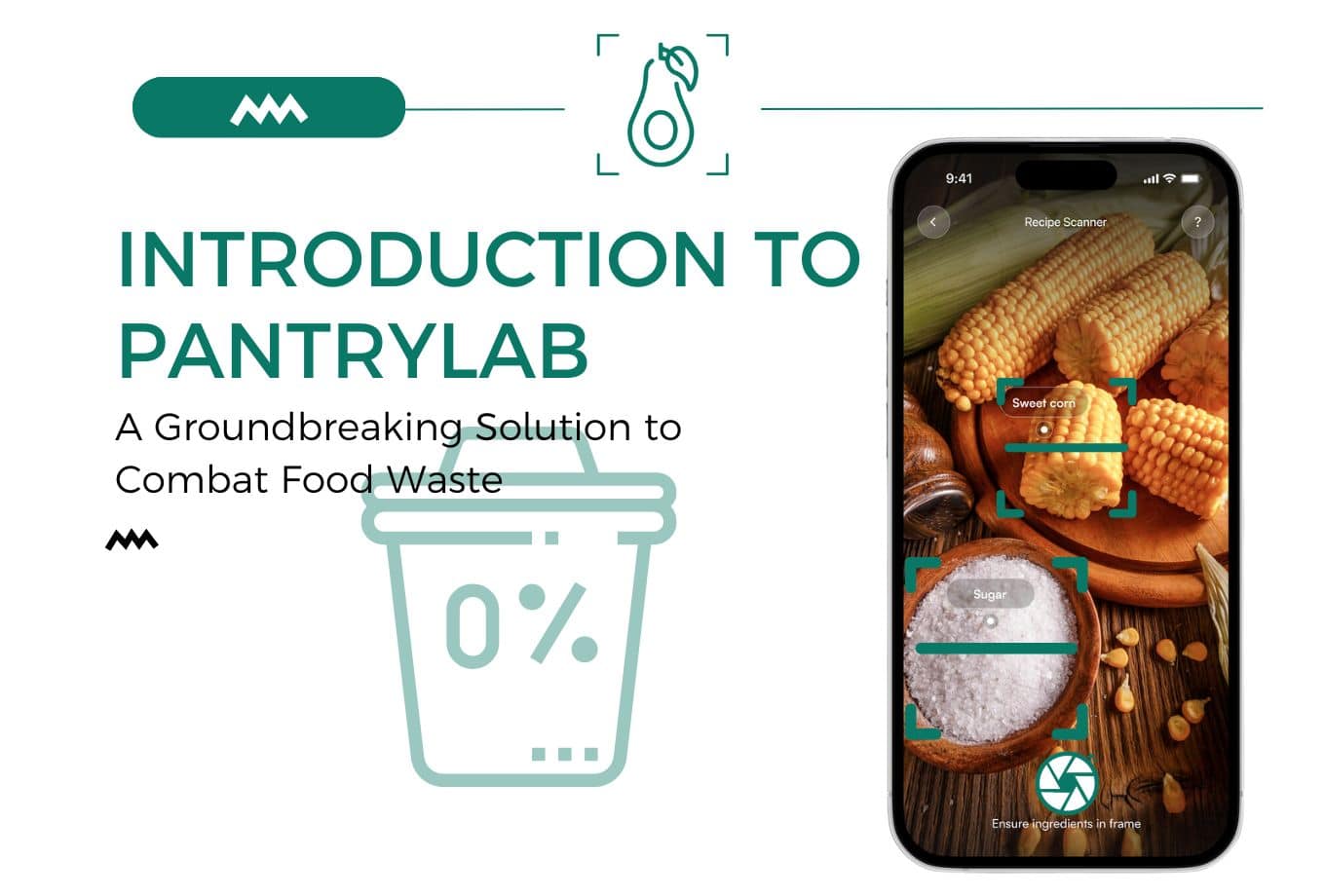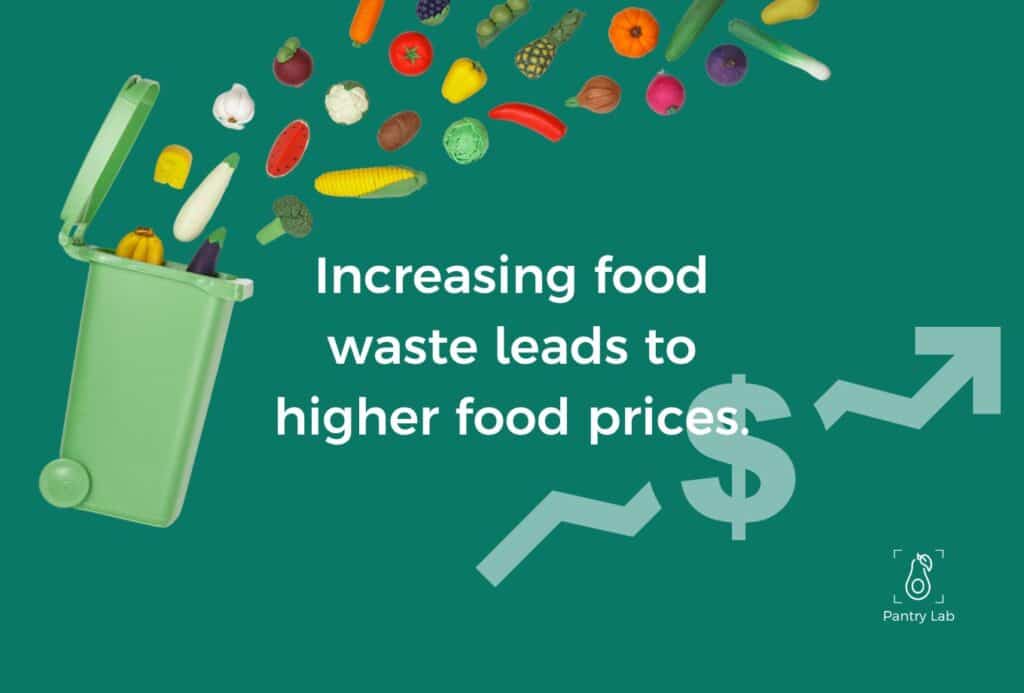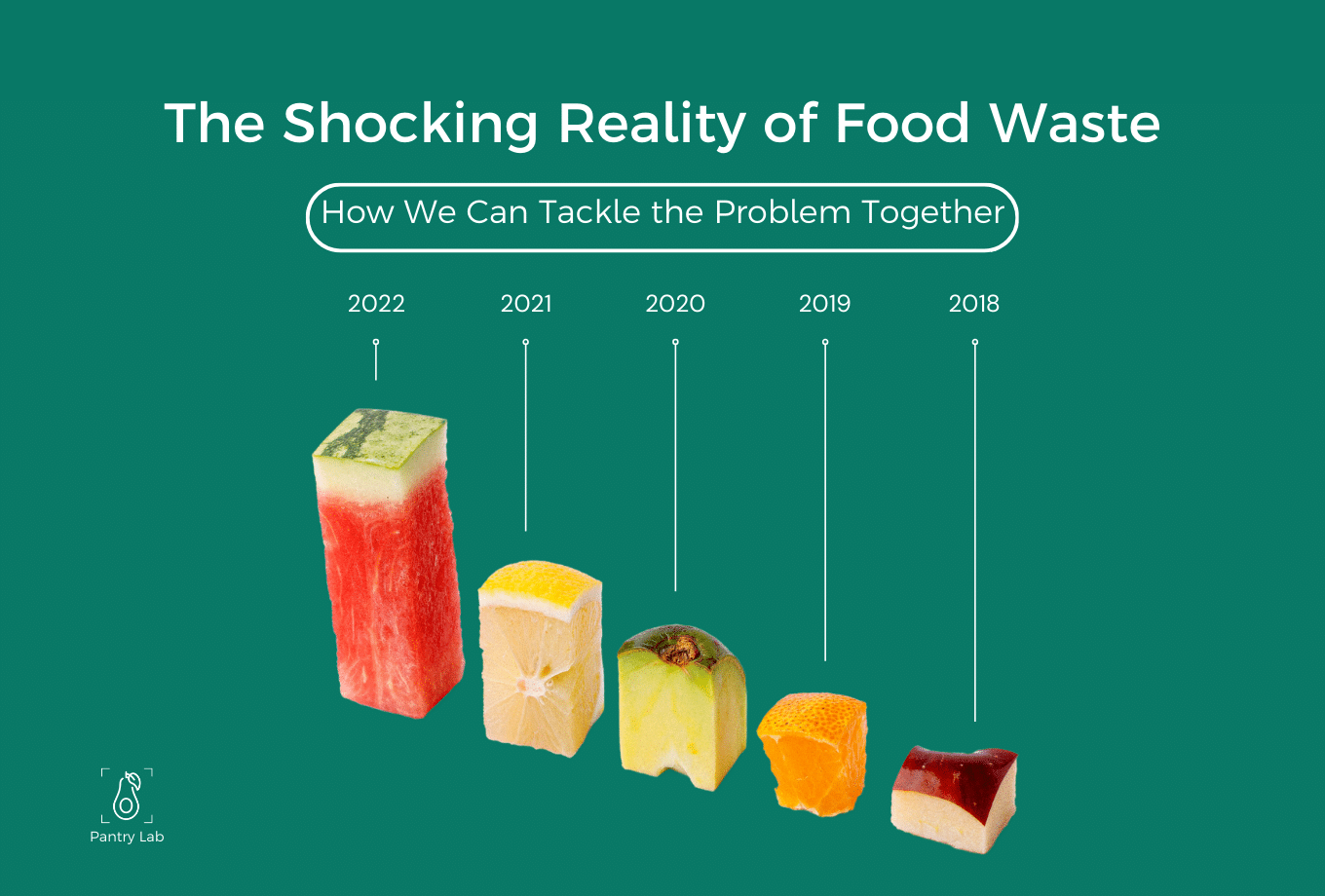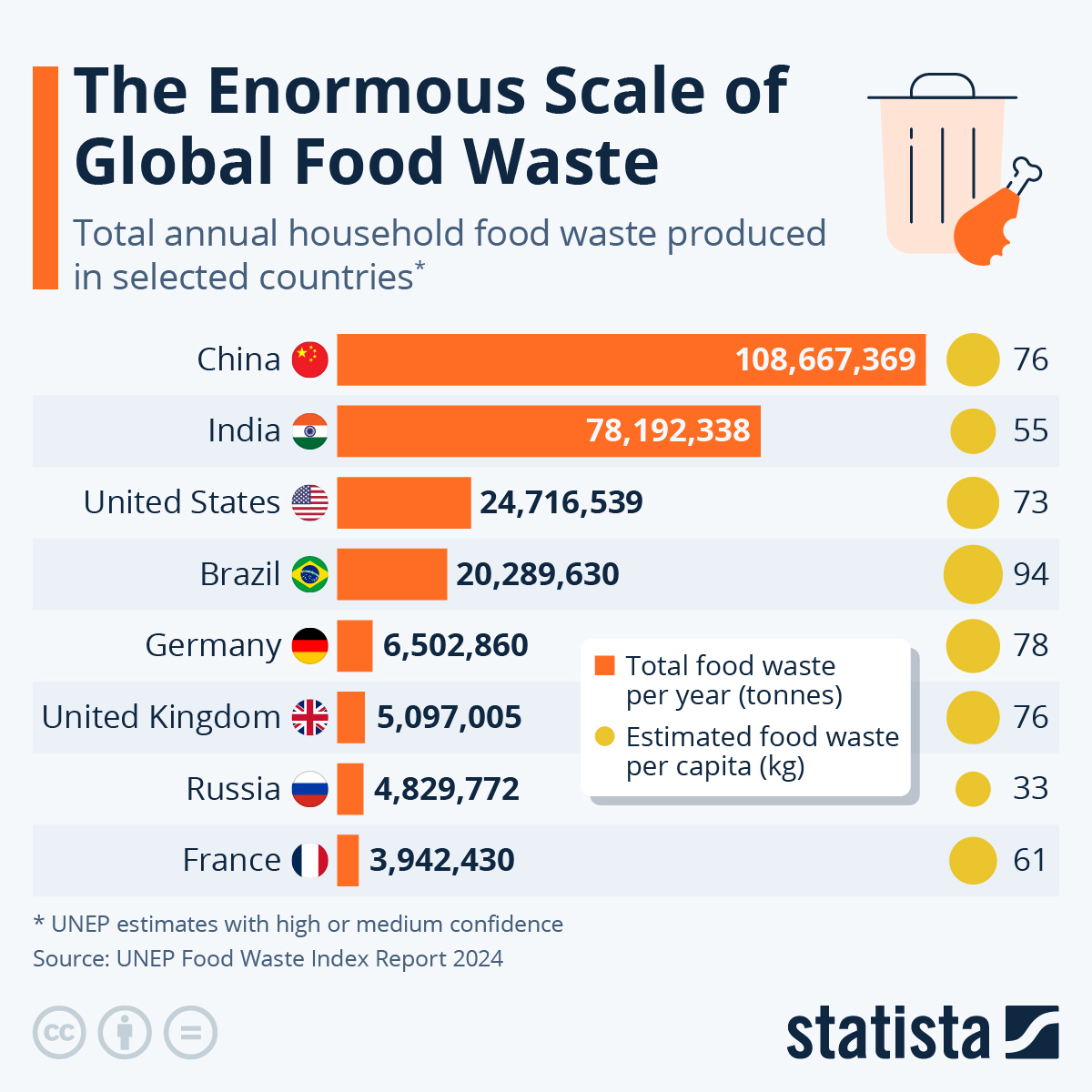
Introduction to PantryLab: A Groundbreaking Solution to Combat Food Waste
April 14, 2024Did you know that approximately one-third of the food produced worldwide goes to waste? It’s a shocking reality that not only affects our environment but also exacerbates global hunger issues. In this article, we will delve into the problem of food waste, exploring its causes and consequences.
Food waste occurs at every stage of the supply chain, from production and processing to distribution and consumption. It’s not just the fruits and vegetables that end up in the trash; perfectly good grains, dairy products, and even canned goods contribute to this staggering waste. As individuals, we can also play our part in reducing food waste by being mindful of our consumption habits and implementing simple strategies in our daily lives.
Together, we can tackle the problem of food waste. By understanding the consequences and taking action, we can make a significant impact on the environment and help alleviate global hunger. Through awareness and practical solutions, we have the power to reduce waste, save resources, and ensure that everyone has access to nutritious food. Let’s take a stand against food waste and work towards a more sustainable future.
The Environmental Impact of Food Waste
Food waste has significant environmental consequences that are often overlooked. When food ends up in landfills, it decomposes and produces methane, a potent greenhouse gas that contributes to climate change. According to the Food and Agriculture Organization (FAO) of the United Nations, if food waste were a country, it would be the third-largest emitter of greenhouse gases after the United States and China. The production of wasted food also requires valuable resources such as water, energy, and land, which are wasted along with the food.
Furthermore, food waste contributes to biodiversity loss. The resources used to produce food, such as water and land, are often obtained through environmentally destructive practices, including deforestation and habitat destruction. When this food is wasted, it means the resources were used in vain, leading to the loss of ecosystems and the species that rely on them.
To address the environmental impact of food waste, it’s crucial to reduce waste at every stage of the supply chain. From improving agricultural practices to implementing efficient transportation and distribution systems, there are numerous strategies that can be employed. Additionally, consumers can play a vital role by making conscious choices and minimizing food waste in their households.
The Economic Consequences of Food Waste
Food waste not only has environmental repercussions but also significant economic consequences. When food is wasted, all the resources used in its production, including labor, water, and energy, go to waste as well. This results in a substantial economic loss for farmers, food manufacturers, and retailers. In developing countries, where food insecurity is a prevalent issue, the economic impact of food waste is particularly severe.

Moreover, food waste contributes to rising food prices. When food is wasted, the demand for new food increases, leading to higher prices in the market. This increase in food prices disproportionately affects low-income households, making it even more difficult for them to access nutritious food. By reducing food waste, we can help stabilize food prices and make food more affordable and accessible for everyone.
To combat the economic consequences of food waste, there is a need for better planning and coordination throughout the supply chain. Improved inventory management, efficient distribution systems, and collaboration between producers, retailers, and consumers can help minimize waste and maximize economic value. Additionally, innovative solutions such as food waste recycling and repurposing can create new economic opportunities and contribute to a circular economy.
Food Waste Statistics
To fully grasp the extent of the food waste problem, let’s take a look at some alarming statistics. According to the FAO, around 1.3 billion tonnes of food are wasted globally each year. This accounts for approximately one-third of all food produced for human consumption. In terms of economic value, this waste amounts to roughly $1 trillion annually.
In developed countries, consumers are responsible for a significant portion of food waste. In the United States alone, it is estimated that 30-40% of the food supply is wasted, equivalent to approximately 133 billion pounds of food each year. This waste has a value of around $161 billion. On the other hand, in developing countries, food waste often occurs at the post-harvest and processing stages due to inadequate infrastructure and storage facilities.
These statistics highlight the urgent need for action to reduce food waste globally. By implementing effective strategies and raising awareness, we can make a substantial impact on these staggering numbers and create a more sustainable food system.
Causes of Food Waste
Food waste is a complex issue with various underlying causes. Understanding these causes is essential in developing effective solutions to tackle the problem. One significant cause of food waste is overproduction. To meet the demands of consumers and ensure a consistent supply, food producers often produce more than necessary. This excess food often goes unsold and ends up being discarded.
Another cause of food waste is poor infrastructure and storage facilities. Inadequate transportation and storage systems can lead to food spoilage and loss during the distribution process. This is particularly prevalent in developing countries where the lack of proper infrastructure hinders efficient food delivery.
Consumer behavior also plays a significant role in food waste. Consumers often purchase more food than they need and fail to utilize it before it spoils. Additionally, aesthetic standards contribute to food waste. Consumers tend to reject imperfect-looking fruits and vegetables, leading to a substantial amount of edible food being discarded.
To address these causes of food waste, a multifaceted approach is required. This includes improving production practices, investing in infrastructure, educating consumers about food waste, and advocating for policy changes that promote sustainability throughout the supply chain.
Solutions to Reduce Food Waste at Home
Reducing food waste starts in our own homes. By making conscious choices and implementing practical strategies, we can significantly reduce the amount of food we throw away. Adding to these traditional methods, innovative technology and food waste redcuction apps like PantryLab offers a modern solution to an age-old problem. Here are some simple solutions to help you get started, enhanced by PantryLab’s capabilities:
- Plan your meals and make a shopping list: By planning your meals in advance and making a shopping list, you can avoid buying unnecessary items that may end up going to waste. Take stock of what you already have in your pantry and fridge before heading to the grocery store. PantryLab enhances this process by utilizing AI to scan your pantry and fridge, identifying ingredients you already have. This allows you to create a more accurate shopping list, ensuring you only buy what you need, thus reducing waste and saving money.
- Store food properly: Proper storage is crucial in maintaining the freshness and longevity of your food. Make sure to store perishable items, such as fruits and vegetables, in the refrigerator to extend their shelf life. Use airtight containers to store leftovers and label them with dates for easy identification. PantryLab contributes by providing notifications about the items nearing their expiry dates, encouraging you to use them before they go bad.
- Embrace leftovers and repurposing: Leftovers can be transformed into delicious new meals. Get creative with your leftovers by incorporating them into new recipes or repurposing them for another day. For example, leftover roasted chicken can be used in sandwiches or salads, and overripe bananas can be turned into smoothies or baked goods. With PantryLab’s tailored recipe suggestions, you can easily find innovative ways to repurpose leftovers based on what’s available in your kitchen, ensuring that food is consumed rather than wasted.
PantryLab’s solution integrates smoothly with these practical steps to reduce food waste at home. By leveraging AI and machine learning, PantryLab not only helps in efficiently managing food inventory but also in making informed decisions about food usage. This smart approach not only reduces waste but also contributes to a sustainable environment by minimizing the carbon footprint associated with food production and waste.
Implementing these solutions, with the support of PantryLab, can significantly impact our efforts to reduce food waste at home. By being mindful of our consumption habits and utilizing the most of what we have, complemented by PantryLab’s innovative technology, we can make a considerable difference in our kitchens and beyond.
Organizations and Initiatives Fighting Food Waste
Numerous organizations and initiatives are actively working towards reducing food waste and ensuring that valuable resources are not wasted. These organizations play a vital role in raising awareness, implementing solutions, and inspiring change. Here are a few notable organizations and initiatives fighting food waste:
1. Food Recovery Network: The Food Recovery Network is a student-led organization that works to recover surplus food from college campuses and distribute it to those in need. They have chapters across the United States and have recovered millions of pounds of food to date.
2. Feeding America: Feeding America is a nationwide network of food banks that works to address food insecurity and reduce food waste. They collaborate with various partners, including food manufacturers, retailers, and farmers, to rescue and distribute surplus food to individuals and families facing hunger.
3. The Too Good To Go app: The Too Good To Go app is an innovative solution that connects individuals with restaurants and retailers that have surplus food. Users can purchase “surprise bags” at a discounted price, containing surplus food that would otherwise go to waste.
These organizations and initiatives are making a significant impact in the fight against food waste. By supporting and getting involved with such initiatives, we can contribute to a more sustainable and equitable future.
Embracing Innovation with PantryLab
Food waste is a pervasive global problem with far-reaching environmental, economic, and social consequences. Tackling this challenge requires a multifaceted approach, incorporating understanding, practical solutions, technology, and community support. Among the vanguard of this fight is PantryLab, an AI-powered solution designed to minimize food waste in homes and beyond.
Individual Actions and Conscious Choices: Reducing food waste begins with each of us. By being more mindful of our consumption habits, planning our meals, storing food correctly, and utilizing leftovers creatively, we significantly cut down on waste. PantryLab plays a crucial role here, providing a digital assistant that helps manage our food inventory more effectively, suggesting recipes based on what we already have, and alerting us to use ingredients before they expire. This personal responsibility is our first step toward sustainability.
Supporting Local Initiatives: Beyond individual efforts, supporting restaurants and grocery stores committed to reducing waste is vital. These establishments, when equipped with technology like PantryLab, can optimize their operations—reducing surplus food through better inventory management and connecting with local food banks to donate unneeded items. By patronizing businesses that prioritize sustainability, we contribute to a larger culture of waste reduction.
Leveraging Technology for a Sustainable Future: Technology is a powerful ally in the fight against food waste. Innovative tools like PantryLab harness AI and machine learning to transform the way we think about and manage our food. By adopting such technologies, we empower ourselves with the knowledge and capabilities needed to make informed decisions, minimize waste, and support a sustainable future.
Joining Forces with Organizations: Supporting organizations and initiatives that combat food waste amplifies our impact. Whether through volunteering, financial contributions, or spreading the word, our collective efforts can lead to significant change. PantryLab’s mission aligns with this goal, offering both a practical tool for individuals and a partner for organizations striving to reduce food waste and its associated impacts.
In conclusion, the journey to minimize food waste is one we undertake together, armed with awareness, practical strategies, and innovative technologies like PantryLab. By taking action, embracing solutions such as PantryLab, and supporting efforts at all levels, we can address the shocking reality of food waste. Let us move forward with determination and optimism, working towards a future where food is valued and conserved, ensuring access to nutritious meals for all and a healthier planet. Together, we can make a lasting difference. Let’s not waste this opportunity.





